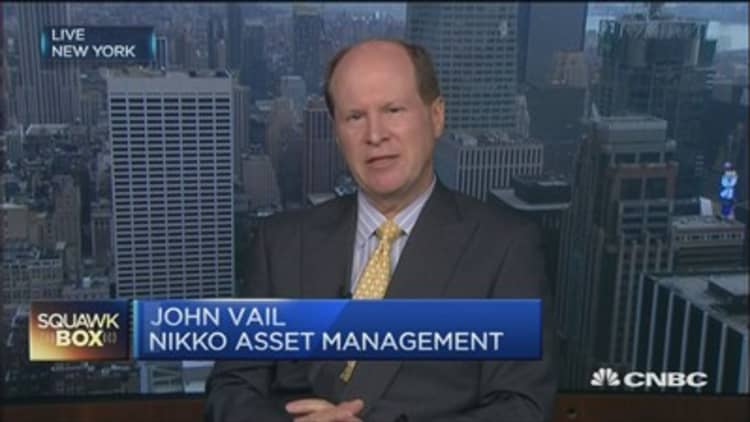
The Bank of Japan's (BOJ) efforts to reach its 2 percent inflation target didn't get much of a boost from the latest data, with the country's core consumer price index for June barely budged and as households unexpectedly snapped their wallets shut.
Japan's core consumer price index (CPI), which excludes fresh food, rose 0.1 percent on-year in June, a tad above the 0.0 percent forecast in a Reuters poll. The "core-core" CPI, which excludes both food and energy prices, rose 0.6 percent from a year earlier.
But household spending unexpectedly fell 2.0 percent on-year in June, sharply underperforming expectations for a 1.7 percent rise from a Reuters poll. That follows May's 4.8 percent increase, which was the the first on-year increase in the data since the country increased its consumption tax last year.
Read MoreJapan's economic transformation: Are we there yet?
"Today's data provide some tentative signs that underlying price pressure has started to strengthen again. But with consumer spending falling to the lowest level since last year's sales tax hike, we see little chances that the 2 percent inflation target will be hit by next summer," Marcel Thieliant, a Japan economist at Capital Economics, said in a note Friday.
"The Bank is pinning its hopes on a strong rebound in demand, which would create capacity shortages and stoke price pressures. Unfortunately, today's data on consumer spending underline that these hopes are unlikely to materialize," he said.
The seasonally adjusted jobless rate rose to 3.4 percent in June, slightly above the 3.3 percent forecast in a Reuters poll.
The Japanese yen strengthened after the data, with the U.S. dollar fetching 123.97 after the stock market opened, from 124.15 prior to the data release. The index was down 0.3 percent in early trade.
To be sure, the weather may have played a hand in the drop in household spending. A Japan government official laid the blame on bad weather for the month, adding that June's decline doesn't necessarily mean there's a change in the moderate uptrend in household spending, according to a Reuters report.
Most of Japan experiences a rainy season in June, but while that's an annual occurrence, some reports said there were more rainy days than usual this year. Lower than usual temperatures may also have hurt clothing sales.
In addition, one particular component of the CPI may be dragging on efforts to boost inflation: housing.
"We're not going to see inflation really pick up in Japan until housing rents start to rise. They're a big component of the CPI and they're still struggling. Until we see that, the index will be mired in this 1 percent and below level, in my view," John Vail, chief global strategist at Nikko Asset Management, told CNBC.
Read MoreWhy investors think Japan has some pretty hot property
While Japan's residential property price index for April was up 3.8 percent from a year earlier, most segments of the index are still lower than levels in 2007, before the Global Financial Crisis.
Japan's policymakers have struggled to kick start the economy after decades of deflation, with the Bank of Japan launching a massive easing program in 2013 as part of "Abenomics," Japanese Prime Minister Shinzo Abe's plan to return the country to growth.
But after a consumption tax hike to 8 percent from 5 percent in April of 2014, the economy got clobbered when consumers stopped spending, forcing the government to postpone a second sales tax initially due this October.
—By CNBC.Com's Leslie Shaffer; Follow her on Twitter @LeslieShaffer1


